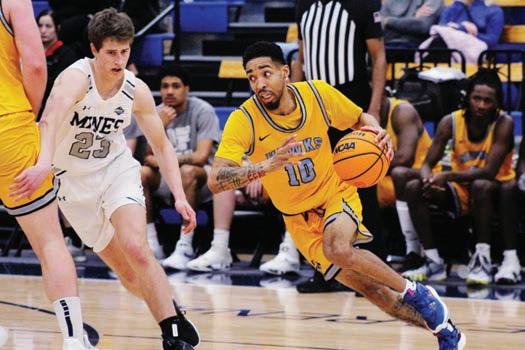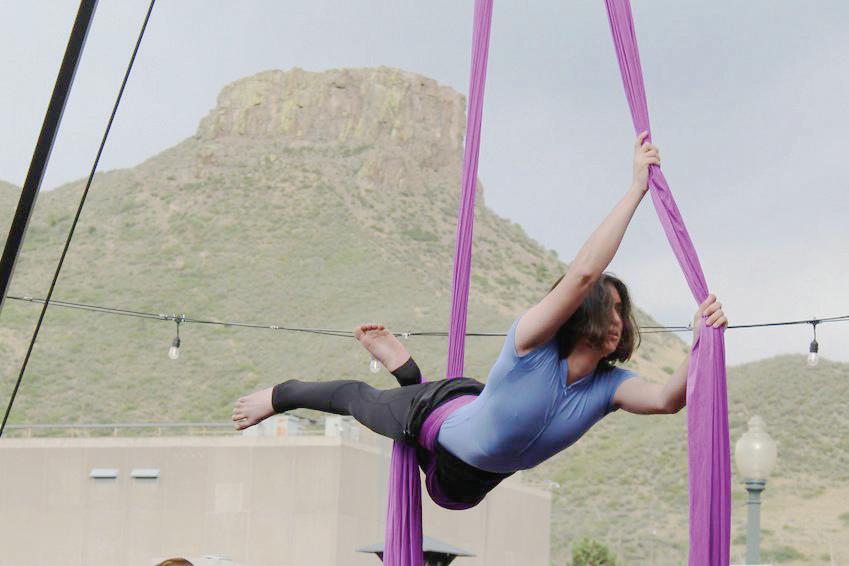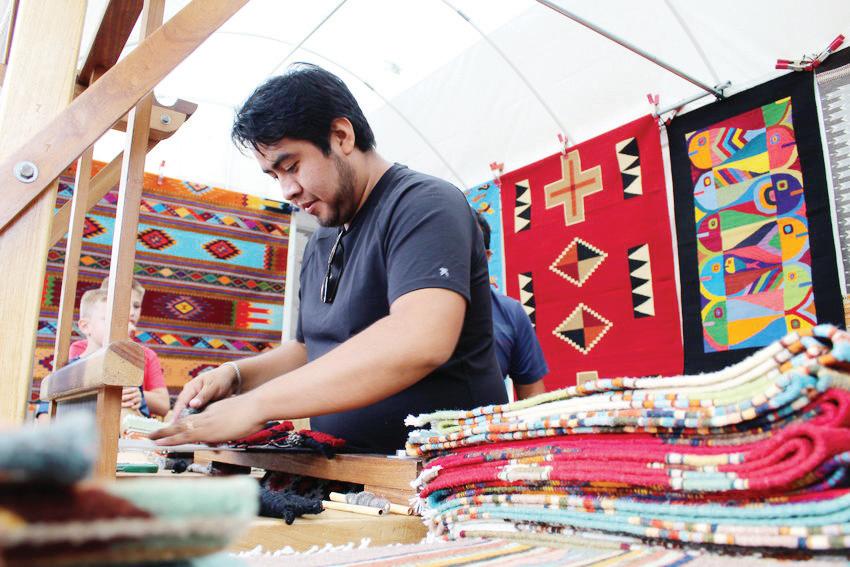
4 minute read
MEN’S BASKETBALL FALLS TO FORT
Mines

one. ey directed sta to begin a thorough public input process with event organizers, participants, residents and other stakeholders.
Mayor Laura Weinberg wondered whether the growing crowds at these events are manageable or sustainable, and wanted to see more data on how many attendees they draw so the city and organizers can nd solutions.
“I think the discussion is for 2023, but with possible changes in 2024,” Weinberg said. “ … We love the event, but we’re loving it to death. How do we make it sustainable for future years? … We won’t know until we go through the process.”
Passionate public comments
e Jan. 24 meeting was standing room only, as more than 70 Goldenites packed the room in support of downtown’s summertime events. On top of dozens of emails to councilors and sta , about 40 people submitted in-person public comments over an hour-and-a-half period.
Representatives from the Golden Chamber of Commerce, Lions Club, Foothills Art Center and Bu alo Bill Days stressed how important their events are to their organizations and the community. Changing the dates or locations for 2023 would be catastrophic, as vendors might back out and out-of-town volunteers would have to change their travel schedules.
“Planning these events is a yearround endeavor,” said Nola Krajewski of the Golden Chamber of Commerce, which hosts the farmers market and ne arts festival. “Being asked to move on short notice is setting us up for failure. … is is a conversation for 2024, not 2023.” e chamber’s Lora Knowlton described the equation needed to host a successful event, and changing any of those factors could damage “a community tradition with a wellestablished reputation.” She said, when relocating events, organizers need at least a year to plan with the vendors and reeducate the public.


Bob Bush, president of Bu alo Bill Days, said he’s met people who travel from other states and plan their entire summer vacations around the festival.


“Please, please don’t destroy it, which is what I see happening,” he continued.
Business owners said they see a spike in revenues during these events, and wanted to see their dates and locations stay the same.
“If the events are moved, it’s possible they’ll go away entirely,” Bu alo Rose owner Chris Cone said. “ ey’ll be greatly diminished if they’re rescheduled or relocated.”
Overall, most who spoke perceived city o cials as giving tourists, particularly tubers, preference over Golden’s traditions and small-town atmosphere. e city’s changed too much in recent years, they said, and these events help make Golden what it is.
“ e heart of Golden is our traditions and our festivals,” the Lions Club’s Sondra Welsh said. “ … We helped build this community, and we want to be a part of it. Please don’t move or kill our favorite events.”
A clear (creek) issue
During public comment, several community members asked city o cials to do more in managing those visiting Clear Creek. Parking is nearly impossible; sidewalks are crowded; intersections are impassable; and trash is everywhere. ey o ered possible solutions, like restricting access to the creek during festivals or restricting tubing to just those who’ve rented tubes from licensed out tters.
While it might seem easy to just restrict tubing access during big events, city o cials explained how Clear Creek is state-regulated water. us, there are very few times when Golden can limit access to the creek. e pandemic was one of them, but even then, Golden had to navigate the legal mine eld very carefully.
Residents also believed that tubers and others visiting the creek have little to no economic bene t, while the events clearly generate sales tax revenues for the city, both directly and indirectly.


However, Adventure West owners Elizabeth and Mitchell Battilla said tubing has more economic bene ts than most realize.
Peak tubing season is from midJuly through August, and people visit Golden seven days a week to tube.
Elizabeth Battilla said city data has con rmed that 70-80% of tubers spend money eating, drinking, shopping and lodging in Golden.
She also spoke in favor of events, saying they “can be married nicely with tubing.” She emphasized how both events and tubing bring diversity to Golden, particularly socioeconomic and racial diversity — something the community seems to value.
(Editor’s note: the Transcript will have more coverage on the city’s ideas for summertime creek management in the Feb. 9 edition)
The bigger picture
After the lengthy public comment period, the councilors stressed how, despite rumors on social media, the city hadn’t made any decisions yet. ey wondered if people didn’t understand the materials in the Jan. 24 meeting packet or how the city’s process works.
e Jan. 24 meeting packet included a memo stating, “Sta is looking for informal Council direction and recommends working with event organizers … to nd alternative days and/or locations to hold their events for 2023 and not allow any new events for weekends in that
FROM PAGE2 location.”
Councilor Rob Reed understood how the memo generated concern in the community, but added how sta ’s job is “coming up with ideas to present to us.”
He and Weinberg said Golden is being “loved to death” during summer weekends, and the city must keep downtown safe and accessible for everyone. So, moving events’ dates or locations should at least be considered, o cials stated.
“I don’t think necessarily the time and location of them should be sacrosanct,” Councilor Casey Brown said of events in 2024 and beyond. “I think those should always be on the table. … We have to control and manage change.”
Having events in July and August is just layering more visitors on top of an already crowded downtown, councilors stated, and most of the events were in other locations previously.

Weinberg pointed out how many of them have reached carrying capacity. e crowds have grown over the years, but the venues are the same size. So, it might be best to nd alternative locations where they can continue growing — locations with more parking and accessibility.
Ultimately, Councilor JJ Trout emphasized how o cials aren’t trying to get rid of events “because we want more tubers.” Instead, they’re trying to improve things along the creek corridor and throughout downtown to improve everyone’s quality of life.







